
Seaman Who Spent 83 Days on Raft Tells of Ordeal Here
High ln the skies is a God or a special angel who keeps watch over men stranded on the sea in life rafts, Seaman 1/c Basil D. Izzi of South Barre, Mass, testified here today.
With four other men, two of them Dutch crewmen, the slender, dark-skinned Seaman Izzi was on a raft in the south Atlantic for 83 days, following the torpedoing of his vessel. The other two Americans died before the survivors were rescued January 24, 1943.
“I just had faith that we would be rescued, and I prayed harder than I had ever prayed before,” Seaman Izzi told reporters. “I know it must have been that faith and those prayers that rescued us.
“I could see the men’s attitude toward prayer change, the longer we were stranded. But it was a strange thing. The skies would be blue and cloudless. We would pray for rain, and within maybe a couple of hours or at least the next day a dark cloud would suddenly appear, and rain would come.
“We would pray for Just one thing at a time. I’ll never forget Thanksgiving Day. We needed food and we caught an albatross.”
Missourian Died.
One of the Americans on the raft with Seaman Izzi was George Beasley of Hannibal. Mo., who had been picked up previously by Izzi’s ship, victim of a prior torpedoing. He died on the 66th day. Ensign James Maddox. Seaman Izzi’s former gunnery officer, died on the morning of the 77th day.
Seaman Izzi was thrown clear of the wreckage when his boat was torpedoed by a Nazi submarine November 2. 1942 . He grabbed a bamboo life mat and for two nights and a day stayed afloat on that before he was picked up by the life raft. He was the last man aboard.
The raft was wooden, about 8x9 feet. If It had been a regulation rubber boat, Izzi said, the sharks probably would have been able to tear it apart.
A kind of democracy—in which every man took only his share, and tried to help his neighbor—was established in that tiny world, Seaman Izzi said.
Harmony Most of Time.
“I won’t say there weren’t quarrels,” he said. “But there was harmony most of the time. Usually, when we had a little friction, we were able to shake hands by nightfall and we would be good friends again.
“If one of us caught a fish, that one didn’t eat the whole thing. Even if it was only a snail, we’d divide it with the others. We would rotate our duties, and each day a different one would hand out certain provisions, to make sure everything was fair.”
Most of the time. Seaman Izzi said, he was able to hang on tenaciously to the faith that he would be rescued.
“But in the afternoon, when the sun was almost unbearable, and we would get so thirsty, we almost gave up hope. At night, when it would become cool, we would feel better again—but we didn’t dare sleep then, for fear of missing an opportunity of being rescued.”
One thing Seaman Izzi is sure of now—and that’s his acquired distaste for fish.
“I used to be able to eat them but after that experience, no more, thank you.”
Here for Several Weeks
Seaman Izzi will be in the St. Louis area for several weeks, talking with industrial groups, and at plants, under auspices of the Industrial Incentive Division of the Navy Department. He will speak at Chamber of Commerce meetings at 12: 15 and 8 p. m., Wednesday, in the Gold Room of the Hotel Jefferson, and at Big Club Hall, at 8 o’clock tonight.
Employe groups wishing to hear him are asked to contact Lt. Douglas K. Porteous, district naval industrial incentive officer. Railway Exchange Bldg.
